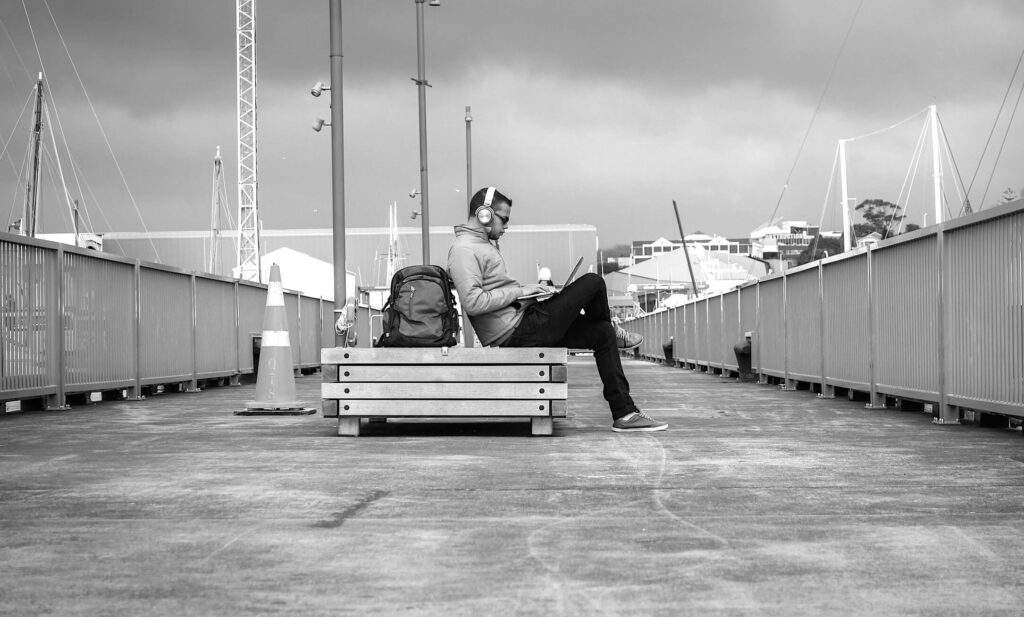Today, trends are changing faster than a viral TikTok campaign, one thing has firmly taken its place in the industry: remote work. What started as a necessity during a time of global upheaval has become a lifestyle, business strategy and competitive advantage for marketers. According to a FlexJobs survey, 73% of workers say the ability to work from home is a deciding factor when choosing an employer. And for digital marketers? It’s practically a love letter to freedom, flexibility, and productivity.
As a digital marketer, you’re already juggling keyword strategies, ad campaigns, and content calendars. Imagine being able to do all of this from a cozy home office, a beachside cafe, or even a mountain hut with Wi-Fi. Remote working isn’t just fun, it’s a revolution that’s changing the way we create, collaborate and conquer the digital space. In this article, we take an in-depth look at why remote working is a game changer for digital marketers, backing up our findings with data, real-life examples, and practical tips to help you succeed in this flexible frontier.
The remote work boom: A digital marketer’s dream
Remote work is experiencing a meteoric rise, and the numbers don’t lie. A FlexJobs study that surveyed more than 7,300 remote workers between the ages of 19 and 60, with 58% of them being parents, found that the appeal of working from home transcends demographics. For digital marketers, this shift is a perfect storm of opportunity. Why? Because our industry thrives on tools like Google Analytics, SEMrush, and Slack that run in the cloud. Whether you’re optimizing a PPC campaign from a loft in Manhattan or developing a content strategy in your backyard in the suburbs, the digital marketing toolkit is inherently convenient for remote work.
The rise of remote work isn’t just a trend, it’s a structural change. Companies like HubSpot, Buffer, and Zapier have fully embraced remote work, proving that distributed teams can produce impressive results. For marketers, this means access to global talent pools, flexible schedules, and the ability to develop campaigns without the constraints of 9-to-5 office labor.
But what makes remote working so irresistible? Let’s break down the key benefits created specifically for marketers and find out how they’re changing the way we think about work.

Why remote work is the best option for digital marketers
1. Work-Life balance: The best campaign optimizer
Let’s be realistic – digital marketing can be a pressure cooker. Between tight deadlines, A/B testing, and chasing algorithm updates, finding balance is harder than ranking for a competitive keyword. Remote work changes the scenario. A FlexJobs survey found that proximity to family is a major advantage for remote workers, especially parents. For marketers, this means you can brainstorm a killer email sequence while watching the kids, or go for an afternoon walk to recharge your creative batteries.
Real-life example: Sarah, a content marketer at a SaaS startup, switched to remote work two years ago. “I used to spend two hours commuting to the office,” she says. “Now I use that time to write blog posts or watch industry podcasts. I’ve become more productive and have time to eat lunch with my toddler.” Sarah’s story isn’t unique – remote working allows marketers to reclaim their time, reduce burnout and stay sharp.
2. Save time and money: More budget for advertising
Time is money, and nowhere is this more true than in digital marketing. Working remotely eliminates the need to commute, which for urban marketers saves 1-3 hours a day. You can spend that time refining ad copy, analyzing campaign data, or even learning a new skill, such as creating AI-powered content. Plus, working from home cuts costs – think gas, parking, work clothes, and overpriced cafe lunches.
Point of reference: A 2023 study by Owl Labs found that remote workers save an average of $6,000 to $12,000 a year in travel and food costs. For freelancers and agency marketers, that’s extra money that can be invested in tools like Ahrefs or subscriptions to premium stock photos.
3. Fewer distractions, more focus
Have you ever tried to write a landing page while coworkers are chatting about last night’s game? The office environment can be the kryptonite of productivity. Remote work offers a more relaxed and controlled space. A FlexJobs study notes that fewer interruptions lead to better focus and increased productivity. For digital marketers, this is gold. Whether you’re immersed in keyword research or developing a social media strategy, a distraction-free zone will allow you to reach peak productivity.
Real-world example: Jake, a PPC specialist, turned his guest room into a minimalist home office. “I have noise-canceling headphones, a clean desk, and no small talk,” he says. “I can spend hours analyzing campaign metrics without taking time away from work.” This organization of Jake’s work has helped him increase his clients’ ROI by 20% in six months.
4. Less stress, more creativity
Driving in rush hour traffic is no more inspiring than a 404 error page. Remote work eliminates that stress, giving marketers the mental clarity to innovate. A FlexJobs study found that reduced commute time is a major plus for urban workers, and it’s easy to see why. Swapping the crowded subway for morning yoga can ignite the creativity that leads to viral campaigns.
Pro tip: Use stress-free mornings to brainstorm big ideas. For example, create a content pillar around a trending topic in your niche, then break it down into blog posts, social media snippets, and email campaigns.
5. Streamlined meetings: Less zoom, more action
If you’ve ever sat in a two-hour meeting that could have been conducted via email, you’ll love this: remote work promotes efficiency. A FlexJobs study found that remote teams have fewer and more focused meetings. For digital marketers, this means less time discussing slide docs and more time implementing campaigns.
Real-world example: Emma, social media manager for an e-commerce brand, says remote working has reduced her meeting load by 50%. “We use asynchronous updates in Trello and only connect to Zoom for big strategic calls,” she explains. “I have more time to create videos for Instagram, and our engagement has increased by 30%”
6. Get past the office politics
Office drama is the ultimate conversion killer. Working remotely puts you at a safe distance from petty rivalries and smokehouse gossip. This is especially valuable in agencies where egos can clash over creative direction. By working remotely, you can focus on what’s important: delivering results for clients or stakeholders.
Pro tip: Use tools like Notion or ClickUp to transparently document your work. This builds trust with remote teams and minimizes miscommunication.
7. Financial freedom for freelancers
For freelance digital marketers, remote work is the ticket to financial independence. You save on office-related expenses while still gaining access to clients around the world. A FlexJobs study notes that remote work allows professionals from smaller cities to compete in global markets, turning regional constraints into opportunities.
Real-life example: Maria, a freelance SEO consultant from a small Midwestern town, found clients in New York and London using Upwork and LinkedIn. “Working remotely allows me to not get hung up on local companies,” she says. “In two years, my income has tripled.”

Beyond the home office: Nomadic life
Remote work doesn’t always mean sitting at home. For some digital marketers, it’s a passport to adventure. A FlexJobs study highlights that the ability to work from anywhere – think co-working centers in Bali or cafes in Paris – is a major lure for freelancers and entrepreneurs. This “digital nomad” lifestyle is especially appealing to young marketers who value experiences over cubicles.
Real-world example: Alex, a content strategist, spent six months working remotely from Southeast Asia. “I wrote blog posts while sitting in a beachside hut and ran Google Ads while sitting in a Hanoi cafe,” he says. “The change of scenery inspired me, and my clients didn’t even notice I was overseas.”
Tip: If the nomadic life tempts you, invest in a reliable VPN and a portable Wi-Fi hotspot to ensure a safe and uninterrupted experience.
The little joys of remote work
Let’s not overlook the little things. Remote work allows you to personalize your workspace – think ergonomic chairs, fancy plants on your desk, or a killer Spotify playlist. You can also ditch the business suit in favor of sweatpants (or, let’s be honest, pajamas). All of these micro-privileges add up and make your workday feel less like a chore and more like a creative playground.
Pro tip: Decorate your home office for inspiration. A vision board with campaign goals or a mood board for your next project can help you get your creative juices flowing.
Problems to watch out for
Remote working isn’t all sunshine and coffee breaks. Isolation, distractions (hello, Netflix) and the temptation to overwork are real obstacles. The FlexJobs survey didn’t sugarcoat these problems, and I won’t sugarcoat them either. To succeed as a remote digital marketer, you need discipline and structure.
Actionable tips:
- Set boundaries: Use a dedicated workspace and stick to a schedule to separate work from life.
- Stay in touch: Schedule virtual chats with coworkers to combat loneliness.
- Track your time: Tools like Toggl can help you stay focused and avoid burnout.
Why remote work is here to stay
The data is clear: remote working is no longer a fad. Companies are doubling down on flexible policies to attract the best talent, and digital marketers are reaping the benefits. A Gallup 2024 poll found that 60% of U.S. workers prefer hybrid or fully remote work, and companies are listening. For marketers, this means more opportunities to work with innovative brands, experiment with cutting-edge tools, and build careers on their own terms.
How digital marketing and remote work fit together perfectly
Digital marketing is uniquely suited to remote work. Our tools – Hootsuite, Canva, Google Ads – run in the cloud, our teams are global, and our campaigns don’t care where we log in from. Plus, the skills we hone remotely (self-discipline, asynchronous communication, data-driven decision making) make us better marketers.
Pro tip: Use remote work for professional development. Use platforms like Coursera or Growth Tribe to learn artificial intelligence marketing, advanced SEO, or video editing – skills that will give you an edge in a competitive marketplace.
Ready to embrace remote work?
Whether you’re an experienced marketer or just starting out, remote work opens up a world of possibilities for you. It’s freedom for creativity, flexibility for life, and productivity for results.
Tell us your story in the comments, how did you transition to remote work?




